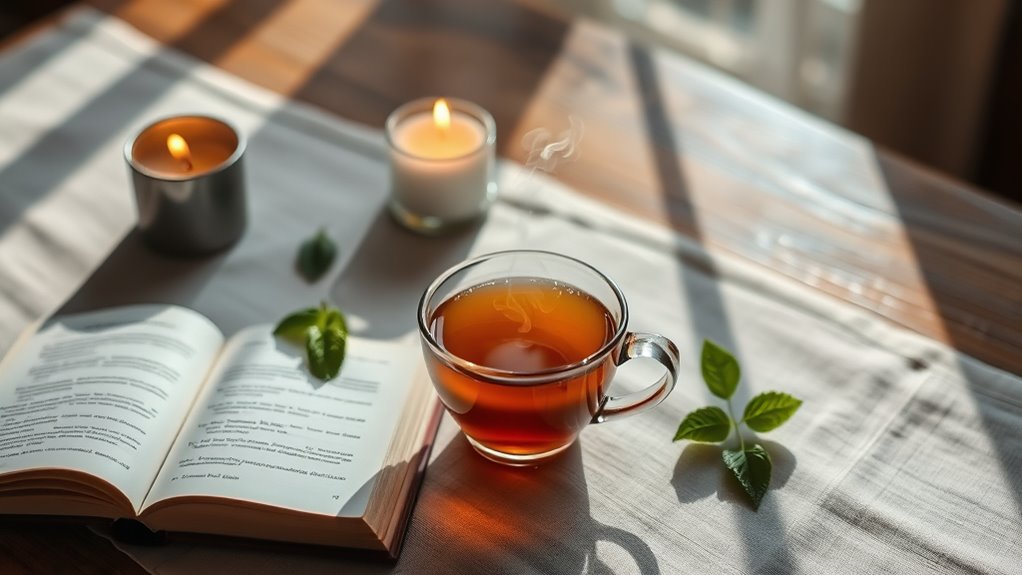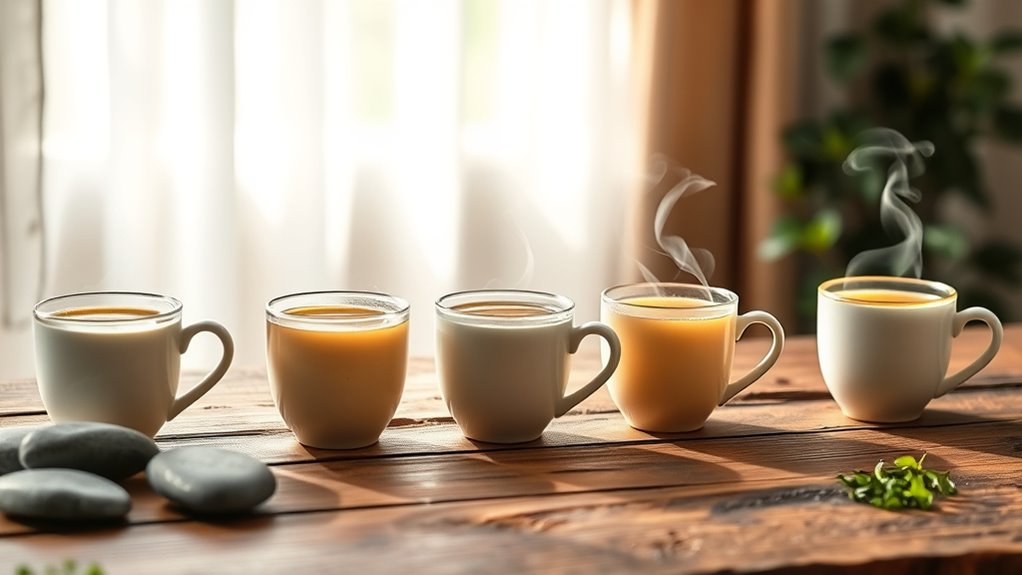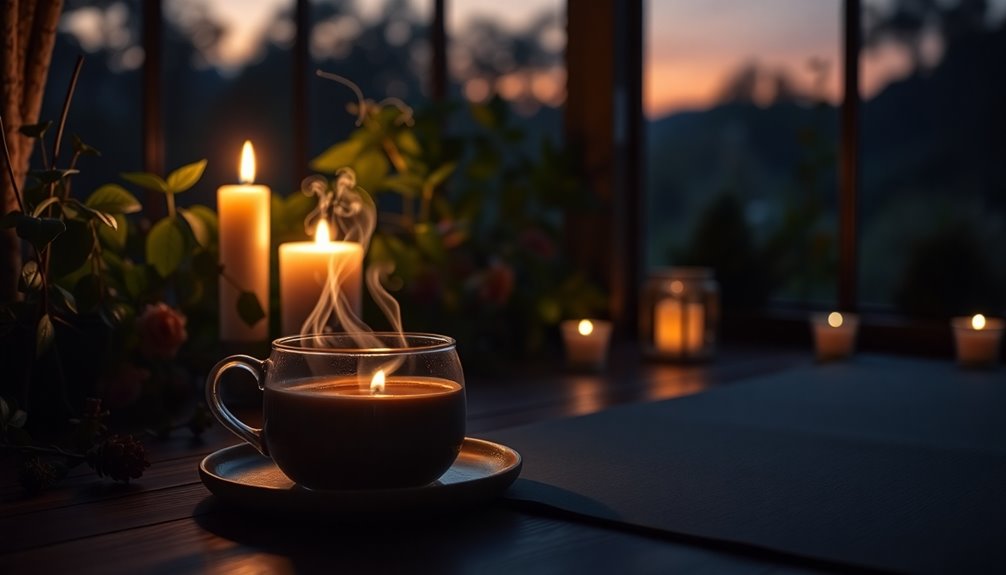Discover five guided tea meditations you can try tonight to soothe your mind and enhance your well-being. These practices focus on sensory awareness, using the warmth, aroma, and taste of your tea to deepen relaxation. By following gentle instructions, you’ll cultivate mindfulness, reduce stress, and foster a calm state of mind. If you want to explore how each meditation works and how to get started, there’s more to learn just ahead.
Key Takeaways
- Explore guided meditations focusing on sensory awareness of tea’s aroma, warmth, and taste to enhance mindfulness.
- Find sessions that incorporate breathing exercises alongside mindful sipping for relaxation.
- Choose meditations that use visualization techniques to deepen mental clarity and calmness.
- Look for practices suited for beginners and experienced meditators to build daily mindfulness habits.
- Select guided teas that promote long-term stress reduction and overall well-being.

Guided tea meditations offer a simple yet powerful way to deepen your mindfulness practice while enjoying a calming cup of tea. When you sit down with a warm beverage, you create an opportunity to center yourself and connect with the present moment. These meditations are designed to guide you through a series of focused awareness exercises, helping you cultivate a sense of calm and clarity. They serve as a gentle reminder to slow down and pay attention to your breath, sensations, and surroundings, making them an excellent addition to your relaxation techniques.
Guided tea meditations deepen mindfulness while promoting calm and clarity through focused sensory awareness.
As you begin a guided tea meditation, start by choosing a quiet space where you won’t be disturbed. Prepare your favorite tea—be it herbal, green, or black—and sit comfortably. The act of holding the warm cup can be an anchor for your attention. Follow the instructor’s voice as they lead you through steps to bring your awareness to the sensation of the tea’s warmth, aroma, and taste. This focus on sensory details helps quiet your mind and anchor you in the present. Throughout the meditation, you’re encouraged to observe any thoughts or feelings without judgment, fostering a non-reactive awareness that strengthens your mindfulness practice.
During these sessions, you’ll learn to use your breath as a tool for relaxation. Breathing slowly and intentionally can markedly reduce stress and promote relaxation techniques. As you sip your tea, notice how each inhale and exhale influences your body. The rhythmic breathing combined with mindful attention to your senses enhances your overall sense of well-being. Guided tea meditations often include visualizations or gentle affirmations, which further deepen your relaxation and mental clarity. These practices are accessible and adaptable, making them suitable for beginners and experienced meditators alike.
Practicing guided tea meditations regularly can help you develop a more mindful approach to everyday life. Over time, you might find it easier to stay present during stressful moments or hectic days. The combination of mindful sipping and relaxation techniques cultivates a peaceful state that you carry with you beyond the meditation. It’s a simple yet effective way to incorporate mindfulness into your daily routine, turning a quiet moment with tea into a nurturing practice that nourishes your mind and body. So, tonight, brew a cup, settle in, and let the gentle guidance lead you into a tranquil, more mindful state.
Understanding the core personality traits involved in mindfulness practices can further enhance your meditative experience.
Frequently Asked Questions
Can I Customize Tea Meditation Practices for Personal Preferences?
Yes, you can definitely customize tea meditation practices to suit your personal preferences. Many practices offer personalization options, allowing you to tailor the experience. You can also incorporate ingredient substitutions to match your taste or dietary needs. This flexibility helps you stay engaged and comfortable during your meditation. Experiment with different teas, scents, or even adding herbs to enhance your mindfulness, making your practice more meaningful and enjoyable.
What Are the Best Teas for Deep Relaxation During Meditation?
If you want to reveal the secret to deep relaxation, the best teas are herbal blends with soothing flavor profiles. Imagine sipping a cup so calming, it melts your stress away instantly. Choose chamomile for gentle serenity, lavender for calming aroma, or valerian root for profound tranquility. These teas naturally enhance your meditation, helping you reach a peaceful state faster and deeper, transforming your practice into a blissful escape.
How Long Should Each Tea Meditation Session Last?
For tea meditation, you should follow the duration guidelines to determine your session length. Typically, a session lasts between 10 to 20 minutes, allowing enough time to relax and focus without feeling rushed. Adjust the session length based on your experience level and time constraints. Keep your attention on the tea and your breath, and gradually extend your practice as you become more comfortable with meditation.
Are There Specific Times of Day Ideal for Tea Meditations?
Thinking about the best time for tea meditation is like finding the perfect melody; it varies for each person. You might find early mornings ideal for a mindful brewing ritual to start fresh or evenings to unwind. The key is to choose a time when you can fully focus, making it a calming tea ritual. Consistency enhances your meditation, so pick a time that fits seamlessly into your daily routine.
Can Tea Meditations Help With Anxiety and Stress Relief?
Tea mindfulness can effectively reduce anxiety and stress when you focus on herbal infusions during your practice. By slow sips and paying attention to flavors, aromas, and sensations, you create a calming routine. This mindful approach helps quiet your mind, relax your body, and promote emotional balance. Incorporating tea meditations into your day offers a soothing, natural way to manage stress and cultivate a sense of peace.
Conclusion
So, after all that calming tea meditation, you might think stress just melts away. Yet, here you are, still juggling deadlines and to-do lists, wondering if a simple cup could truly change everything. Ironically, it’s often the tiniest moments—like sipping tea—that remind us we don’t need grand gestures to find peace. Tonight, you might just discover that the real magic isn’t in the meditation, but in giving yourself permission to pause—even if just for a sip.










